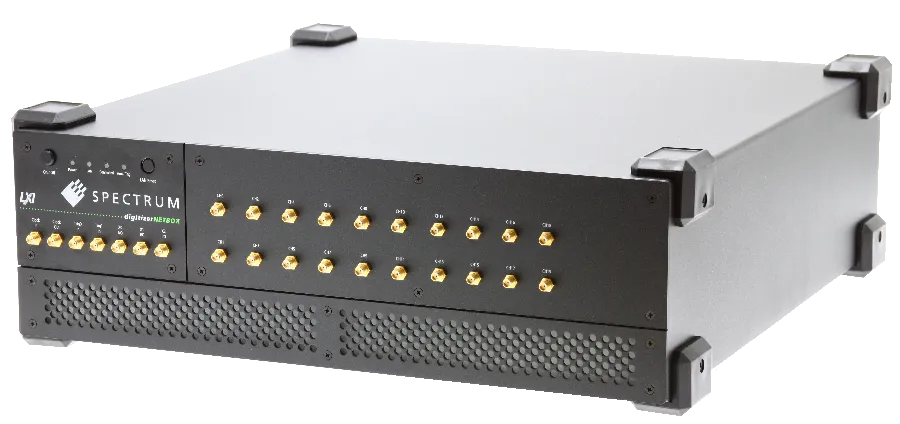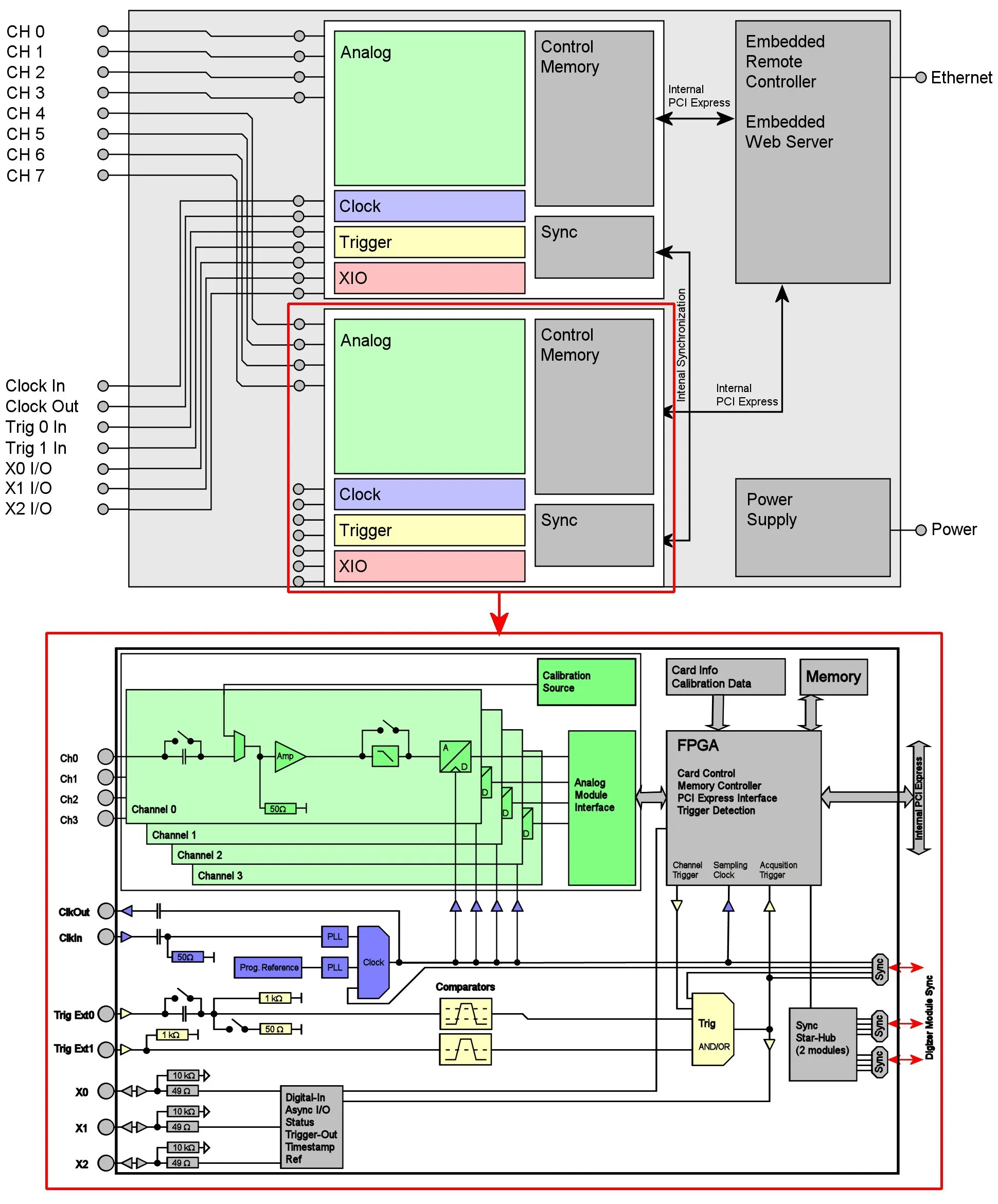Product:
DN6.225-20
8 bit high speed digitizer
Description:
The digitizerNETBOX DN6.22x series allows recording of up to 24 channels with sampling rates of up to 5 GS/s and a bandwidth of 1.5 GHz. These Ethernet Remote instruments offer outstanding A/D features both in bandwidth and signal quality. The combination of high sampling rate and resolution makes these digitizers the top-of-the-range for applications that require high speed signal acquisition. The digitizerNETBOX can be installed anywhere in the company LAN and can be remotley controlled from a host PC.
Facts & Features:
- 5 GS/s on 5 channels
- 2.5 GS/s on 10 channels
- 1.25 GS/s on 20 channels
- 1.5 GHz Bandwidth
- Separate 8 bit ADC and amplifier per channel
- Simultaneous sampling on all channels
- 4 input ranges: ±200 mV up to ±2.5 V
- Optional input ranges: ±40 mV up to ±500 mV
- Window, re-arm, OR/AND trigger
- Complete calibration circuit integrated
- High bandwidth Digitizer
- GBit Ethernet/LXI compatible instrument
- Easy connectivity with BNC/SMA connections
- SBench 6 Professional included
- Direct remote access from Workstations or Laptops
- Simple integration into the factory LAN
Application examples:
- Mobile and/or shared data acquisition
- Remote controlled digitizer at experiment
- Component of LXI test system

The ABA mode combines slow continuous data recording with fast acquisition on trigger events. The ABA mode works like a slow data logger combined with a fast digitizer. The exact position of the trigger events is stored as timestamps in an extra memory.
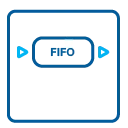
FIFO mode
The FIFO mode is designed for continuous data transfer between the digitizerNETBOX and the host PC. The transfer speed is depending on the Ethernet connection between box and host and is in the region of 40 MB/s to 60 MB/s. The control of the data stream is done automatically by the driver on interrupt request. The complete installed on-board memory is used for buffer data, making the continuous streaming extremely reliable.

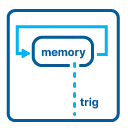
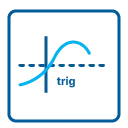
Channel Trigger
The data acquisition boards offer a wide variety of trigger modes. Besides the standard signal checking for level and edge as known from oscilloscopes it's also possible to define a window trigger. Trigger conditions can be combined with logical conjunctions like OR to adopt to different application scenarios.
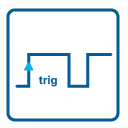
External Trigger
All boards can be triggered using a separate external trigger signal with a two level programmable window comparator and a second separate external trigger with a single programmable level comparator. It's possible to use positive or negative edge. An internally recognized trigger event can - when activated by software - be routed to a multi purpose i/o connector to start external instruments.
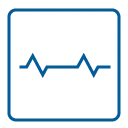
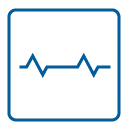
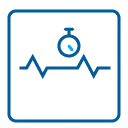
Timestamp
The timestamp option writes the time positions of the trigger events in an extra memory. The timestamps are relative to the start of recording, a defined zero time, externally synchronized to a radio clock, or a GPS receiver. With this option acquisitions of systems on different locations can be set in a precise time relation.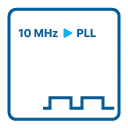
High Precision PLL
The internal sampling clock of the card is generated using a high precision PLL. This powerful device allows to select the sampling rate with a fine step size making it possible to perfectly adopt to different measurement tasks. Most other cards on the market only allow the setup of fixed sampling rates like 100 MS/s, 50 MS/s, 25 MS/s, 10 MS/s, ... without any possibility to set the sampling rate to any value in between.
Reference Clock
The option to use a precise external reference clock (normally 10 MHz) is necessary to synchronize the board for high-quality measurements with external equipment (like a signal source). It's also possible to enhance the quality of the sampling clock in this way. The driver automatically generates the requested sampling clock from the fed in reference clock.
Selectable AC/DC Coupling
Each analog channel contains a software selectable AC/DC coupling. When using the DC coupling all frequency parts of the signal including the DC offset are acquired. Selecting the AC coupling will only acquire frequency parts of the signal that are above a defined minimum bandwidth.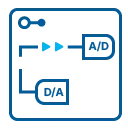
On-board Calibration
The on-board calibration can be run on user request and calibrates the amplifier against a dedicated internal high precision calibration source. After this calibration data is stored permanently in an on-board EEPROM and is automatically used for further acquisitions.
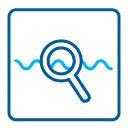
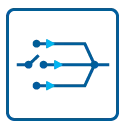
Programmable Input Amplifiers
The analog inputs can be adapted to real world signals using a wide variety of settings that are individual for each channel. By using software commands the input range can be set to a value matching the real world signals. The high precision, high bandwidth 50 ohm inputs are optimized for acquisition of high bandwidth signals.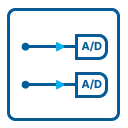
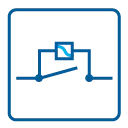
Selectable Low Pass Filter
Each analog channel contains a software selectable low-pass filter to limit the input bandwidth. Reducing the analog input bandwidth results in a lower total noise and can be usefull especially with low voltage input signals.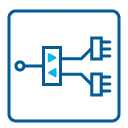
Multi Purpose I/O
All M4i cards offer three universal multi purpose I/O lines, which can be separately programmed as either input or output. When used as outputs, these lines can be used to output card status signals like trigger-armed or to output the trigger to synchronize external equipment.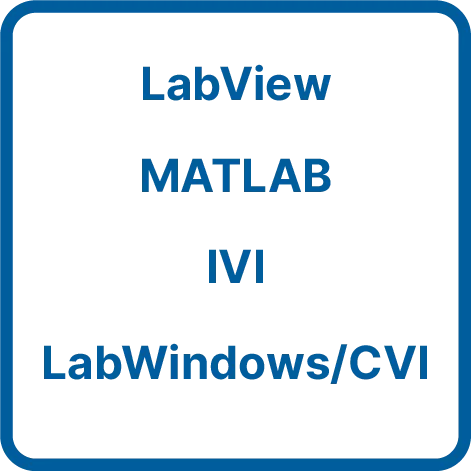
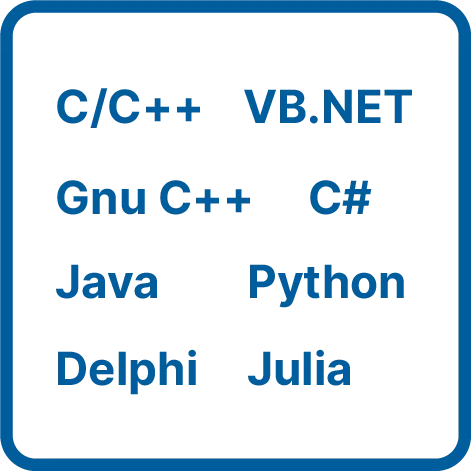

Remote Access
The digitizerNETBOX can be remotely accessed from any current Windows (starting with Windows XP) 32 bit or 64 bit system or Linux (starting with Kernel 2.6) 32 bit or 64 bit system by Ethernet. The remote access is done in the very exact programming like a locally installed product allowing to use any of the supported software packages.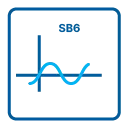
| Product | Channels | Max. Samplerate | Max. Bandwidth |
|---|---|---|---|
| DN6.221-12 | 12 | 1.25 GS/s | 500 MHz |
| DN6.221-16 | 16 | 1.25 GS/s | 500 MHz |
| DN6.221-20 | 20 | 1.25 GS/s | 500 MHz |
| DN6.221-24 | 24 | 1.25 GS/s | 500 MHz |
| DN6.225-12 | 12 | 5 GS/s | 1.50 GHz |
| DN6.225-16 | 16 | 5 GS/s | 1.50 GHz |
| DN6.225-24 | 24 | 5 GS/s | 1.50 GHz |
| On different platforms | Bus | Max. Bus Transfer speed |
|---|---|---|
| DN2.225-04 | Ethernet | 70 MByte/s |
| DN2.225-08 | Ethernet | 70 MByte/s |
| DN6.225-12 | Ethernet | 70 MByte/s |
| DN6.225-16 | Ethernet | 70 MByte/s |
| DN6.225-24 | Ethernet | 70 MByte/s |
| M4i.2234-x8 | PCI Express x8 | 3000 MByte/s |
| M4x.2234-x4 | PXI Express | 1700 MByte/s |
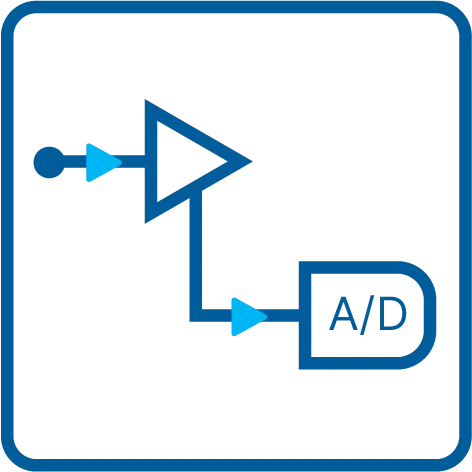
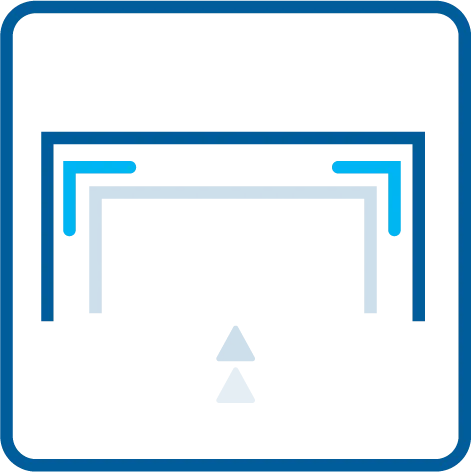
Documents
Signal Processing fro Digitizers |
21.02.2022 | 1 M | ||
Data sheet of digitizerNETBOX DN6.22x |
23.02.2024 | 1 M | ||
Manual of DN2.22x and DN6.22x family |
23.02.2024 | 11 M | ||
Manual for LabVIEW drivers for M4i / M4x |
08.12.2023 | 6 M |
WINDOWS DRIVER + SOFTWARE
M2p/M4i/M4x/M5i/M2i/M3i/DN2/DN6 driver for Windows 7, 8, 10, 11 (32/64 bit) |
7.01 | 22.04.2024 | 5 M | |
C/C++ driver header and library files |
7.01 | 22.04.2024 | 43 K | |
Spectrum Control Center (32-bit) / Windows 7, 8, 10 |
2.36 | 22.04.2024 | 22 M | |
Spectrum Control Center (64-bit) / Windows 7, 8, 10, 11 |
2.36 | 22.04.2024 | 25 M | |
Spectrum Control Center - last Version for Windows XP |
1.74 | 21.02.2022 | 8 M | |
SBench 6 (32-bit) Installer / Windows 7, 8, 10 |
6.5.08 | 22.04.2024 | 36 M | |
SBench 6 (64-bit) Installer / Windows 7, 8, 10, 11 |
6.5.08 | 22.04.2024 | 39 M | |
SBench6 - last Version for Windows XP |
6.3.5 | 21.02.2022 | 41 M | |
IVI Driver for IVI Digitizer class (32 bit) |
22.04.2024 | 3 M | ||
IVI Driver for IVI Scope class (32 bit) |
22.04.2024 | 3 M | ||
M2p/M4i/M4x/M5i/M2i/M3i/DN2/DN6 Matlab driver + examples installer |
22.04.2024 | 15 M | ||
Windows Examples (C/C++, .NET, Delphi, Java, Python, Julia ...) |
7.01 | 22.04.2024 | 2 M |
LINUX DRIVER + SOFTWARE
Driver libraries (no Kernel) for Linux 32 bit and 64 bit |
7.01 | 22.04.2024 | 9 M | |
Spectrum Control Center |
2.36 | 22.04.2024 | 57 M | |
SBench 6 Linux 32 (.rpm) |
6.5.08 | 22.04.2024 | 26 M | |
SBench 6 Linux 64 (.rpm) |
6.5.08 | 22.04.2024 | 26 M | |
SBench 6 Linux 32 (.deb) |
6.5.08 | 22.04.2024 | 23 M | |
SBench 6 Linux 64 (.deb) |
6.5.08 | 22.04.2024 | 22 M | |
SBench6 Jetson (.deb) |
6.5.08 | 22.04.2024 | 11 M | |
Drivers + examples for MATLAB for Linux (DEB + RPM) |
22.04.2024 | 183 K | ||
Linux Examples (C/C++, Python, Julia ...) |
7.01 | 22.04.2024 | 560 K |
Firmware
DN2/DN6 Standard Firmware (install V27 first for updates prior to V27) |
V82 | 22.04.2024 | 34 M |
Case Studies
| CS Mega Gauss | Case Study: Solid State Materials Science using High Magnetic Fields |
21.02.2022 | 3 M |
Product Notes
| General Digitizer Introduction | General Introduction to Waveform Digitizers |
21.02.2022 | 587 K | |
| Digitizer Acquisition Modes | Using modular Digitizer Acquisition Modes |
21.02.2022 | 3 M | |
| Digitizer Front-End | Proper Use of Digitizer Front-End Signal Conditioning |
21.02.2022 | 3 M | |
| Trigger and Sync | Trigger, Clock and Synchronization Details at high-speed Digitizers |
21.02.2022 | 1 M | |
| Digitizer Software Integration | Software Support for Modular Digitizers |
21.02.2022 | 724 K | |
| LXI based Digitizers | LXI based Multi-channel Digitizer Instrument |
21.02.2022 | 739 K | |
| SBench 6 Introduction | SBench 6 - Data Acquisition and Analysis of Digitizer Data |
21.02.2022 | 1 M |
Application Notes
| RF Measurements | RF Measurements using a modular Digitizer |
21.02.2022 | 838 K | |
| Signal Processing Tools | Using Signal Processing Tools to enhance Digitizer Data |
21.02.2022 | 1 M | |
| Using Probes & Sensors | Using Probes and Sensors with Modular Digitizers |
21.02.2022 | 858 K | |
| Solving Data Transfer Bottlenecks on Digitizers | Solving Data Transfer Bottlenecks on Digitizers |
21.02.2022 | 2 M | |
| Teaming AWG with Digitizer | Teaming an Arbitrary Waveform Generator with a Modular Digitizer |
21.02.2022 | 919 K | |
| Common Digitizer Setup Problems | Application Note: Common Digitizer Setup Problems to avoid |
21.02.2022 | 1 M | |
| Mass Spectroscopy | Application Note Mass Spectroscopy |
21.02.2022 | 879 K | |
| AN Amplitude Resolution | Application Note: The Amplitude Resolution of Digitizers and how it affects Measurements |
21.02.2022 | 555 K | |
| AN Radar Signal Acquisition | Application Note: Radar Signal Acquisition with Modular Digitizer |
21.02.2022 | 771 K | |
| AN Dynamic Parameters and Digitizers | Application Note: Dynamic Parameters and Waveform Digitizers |
21.02.2022 | 711 K | |
| AN Characterization of RKE devices | Application Note: Characterization of Remote Keyless Entry device |
21.02.2022 | 1 M | |
| Aircraft Systems Testing | Testing electronic aircraft systems using modular instruments |
21.02.2022 | 3 M |
